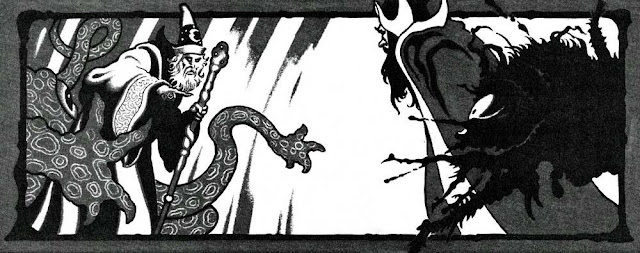I love a spell duel. The scene from Conan the Barbarian movie where the two mages go at it… pure gold!
When I read a post by a gent named duBeers from the wonderful OD&D Boards forum that covered how he did counterspelling, I had to go write my own. After all, if Chainmail could have counterspells, then the game that it influenced, Dungeons & Dragons, could have it too.
I’ve been using these for the past nine years. When it’s happened in-game, it’s been pretty intense to see the players get into it. It shocks the crap out of the mages every time I do it, because they forget that it’s an option. My monsters and NPCs don’t forget…
Here’s how it works:
A magic-user may use his or her arcane knowledge to attempt to neutralize an opponent’s spell. This is referred to a counter-spell or spell duel.
- To engage in a duel a magic-user must be able to see the attacking magic-user.
- Any condition which would prevent a magic-user from casting a spell would likewise prevent him or her from countering of a spell.
- Cleric spells cannot be countered.
- The intent to counter a spell must be declared during round declarations. The DM will let the players know if a monster is casting a spell.
- Attempting a counter-spell fully occupies a magician’s powers and concentration. Engaging in a counter-spell duel negates any further action or spell use by both participants for the remainder of that round.
- The spell duel resolution occurs in the Phase/segment that the spell would have finished in.
Resolving a Spell Duel
- Compare the levels of the countering magic-users with the spell-casting magic-user.
- The mage casting the spell performs a saving throw vs. (Unlisted) Spells. They add (or subtract) the difference of level (HD) between caster and counter-speller. If the save is successful, the caster wins the duel; if not, the counter-speller wins.
- The loser of the spell duel must roll against the table below:
2d6 Result (+1 for each 2 levels that casting MU’s level is higher than countering MU)
| 2 | Unconscious 1d4+1 rounds |
| 3 | 1d4-1 points damage |
| 4-5 | Confusion (1d4+1 rounds) |
| 6 | Charmed – under control of winner of the duel |
| 7-9 | Suffer effects related to attempted spell* |
| 10 | Forget one spell (randomly chosen by DM) |
| 11 | Forget all spells |
| 12+ | Feeblemind (equivalent of 3 INT until a full day’s rest, all spells forgotten) |
* to be determined by referee
Example: Treen, a 2nd level mage, sees that a goblin shaman is about to cast a spell and declares that he will counter the shaman’s spell. The goblin is an HD 1-1 (considered a 1) so must add 1 to their roll. The goblin must roll a 12+1 = 13 to save against Treen’s counter spell. The goblin rolls a 3. It then rolls a 6 on 2d6 and is now considered charmed by Treen.
(Image credits: A duel between wizards in Alphatia is always to the death. [Stephen Fabian, Gazetteer: Dawn of the Emperors by Aaron Allston, TSR, 1989])

Nicely done! Much like your earlier psionics rules, this is a concise way to play out something that tends to spread across pages and pages in many games.
Thank you! I hope you'll give them a try.
*steals rules*
*flees into night*
This is great. Always bothered me that we never have any proper MU duels in my D&D campaign a la Harry Potter. This is a simple resolution and I love simplicity in wargames. Many thanks!
You're very welcome! Enjoy!